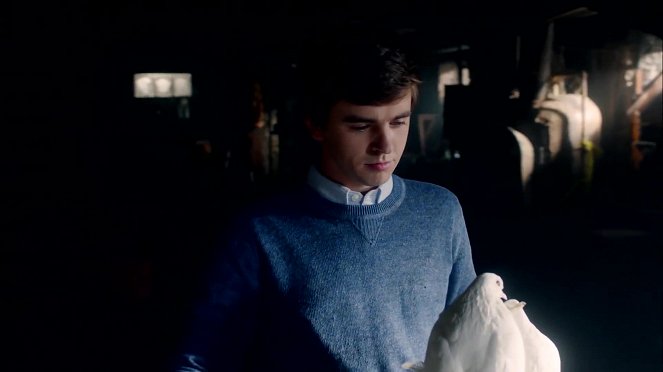Musique:
Chris BaconActeurs·trices:
Freddie Highmore, Vera Farmiga, Max Thieriot, Olivia Cooke, Nestor Carbonell, Nicola Peltz, Mike Vogel, Kenny Johnson, Keegan Connor Tracy (plus)VOD (2)
Saisons(5) / Épisodes(50)
Résumés(1)
Les producteurs de Lost et Friday Night Lights vous entraînent aux origines du chef d'œuvre du film d'horreur, Psychose. Après avoir découvert le corps de son père, le jeune Norman Bates (Freddie Highmore : Arthur et les Minimoys, Charlie et la chocolaterie) et sa mère Norma (Vera Farmiga : Sécurité rapprochée, Source Code) font l'acquisition d'un motel dans la petite ville de White Pine Bay dans le but de reprendre le cours normal de leur vie. Mais cette ville de bord de mer cache de lourds secrets. Ne pouvant faire confiance à personne, leur relation mère-fils va devenir de plus en plus complexe... Vous avez rendez-vous avec celui qui va devenir le tueur en série le plus névrosé de l'histoire du cinéma. (Universal Pictures Vidéo FR)
(plus)Critique de l’utilisateur·trice gudaulin pour cette série (1)
Bates Motel (2013)
Perhaps no other TV series has concentrated all the strong and weak points of American production like Bates Motel. From every frame, you can feel a high level of professionalism and an effort to make a hit, the selection of actors is careful and successful, the plot is attractive, and it is also a safe bet due to the popularity of Hitchcock's Psycho. However, in the end, it uncomfortably drags on. Close to our home, we have a pond that the owner uses for commercial fishing. He serves everything to the customers right under their noses, and in the densely stocked pond, everyone effortlessly finds their fish in the end. Bates Motel works similarly. In the desire for commercial success, the series has widely spread out, developing three storylines that deserve their own shows. One of them focuses on young Norman and his developing mental illness, the second focuses on the lives of local teenagers, and the third, for me the most enticing one, follows the rivalry between two local gangs over control of the marijuana cultivation industry, which supports the local economy. In the midst of all this, Norman's family makes twists and turns. These mentioned storylines sometimes intertwine successfully, but much more often they clash with each other. From an acting perspective, the excellent Vera Farmiga succumbed to the temptation and, as a co-producer of the series, steered her character from an unsympathetic dominant, and manipulative bitch, to an unfortunate and self-sacrificing loving mother, somehow forgetting that the former position is more appealing to viewers. The series comes up with a lot of attractive characters and motifs, but it doesn't know how to work with them. In the first season, there are indeed polished scenes - the episode The Man in Number 9 is more Hitchcockian than anything from the master's workshop - but with the increasing number of episodes, the screenwriter's helplessness becomes increasingly apparent. In a provincial American town, the number of murders is greater than in Detroit. The show is strangely scattered in terms of time and space, mixing anachronistic fashion and objects from different eras, and the outdated Bates Motel from Hitchcock's film looks somehow inappropriate in the era of digital technologies and the turbulent American teenagers of the present. I devoured the first season, the second started to bother me, and I only managed to watch the last three episodes with gritted teeth. I never mustered the courage to watch the third season. In hindsight, I realize that Bates Motel is freeloading on Hitchcock's legacy rather than developing it. Overall impression of both seasons: 55%.
()

